

GDP figures show economy shrank in 2020 but grew 3.1 per cent in December quarter. Australia's economic bounce-back from the COVID-19 pandemic has caught most economists and business operators off guard.
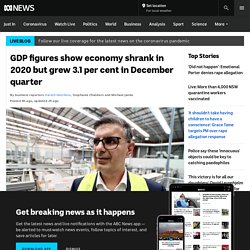
Key points: Australia's economy rebounded strongly in the last six months of 2020In the December quarter, the economy grew 3.1 per cent, after September quarter growth of 3.4 per centHowever, overall, the economy shrank by 1.1 per cent in 2020 "Suppliers are flat out, operating 24 hours a day globally trying to supply the rest of the market," Apollo Joinery Group's managing director Peter Bader told The Business. Apollo designs, manufactures and supplies kitchens for major developments, as well as individual homes. UK suffers record 9.9% slump; KPMG UK chair quits after 'stop moaning' comments – business live.
In 2020, coronavirus shattered economic norms — and we might not have seen the end yet. Over a two-month period between March and April, shares on the Australian stock exchange went into free fall.
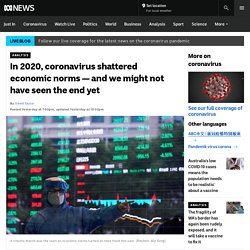
If you've ever jumped from a great height into a pool or lake, you'll know that unnatural, uneasy feeling you experience when, about halfway down, every fibre in your body is yearning to hit the water. I felt something akin to that on Monday morning of March 16. JobSeeker lifted thousands of Australians out of poverty. Experts say the Government doesn't need to send them back - ABC News. Let's introduce a concept to our political discussion.
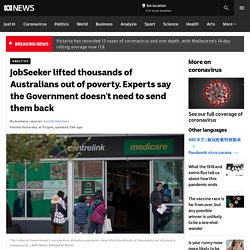
It's called "iatrogenic unemployment". It draws on the word "iatrogenesis," which is a combination of two words in ancient Greek — "iatro" means healer or doctor, and "genesis" means origin. Iatrogenesis refers to something originating from a doctor. In the medical community, the word is used to describe a situation where a doctor, whose job is to care for someone, makes a patient's condition worse through negligence, error, or misdiagnosis. It is also used to explain side effects of treatment. What is the difference between a recession and depression? - ABC News. COVID-19 won't kill the office but people will need reasons not to work from home, experts say - ABC News. UN warns of lost decade without Covid economic recovery plan. The global economy faces a lost decade after the Covid-19 pandemic unless policymakers spurn austerity measures in favour of a comprehensive recovery plan built on investment in sustainable growth, the United Nations has said.
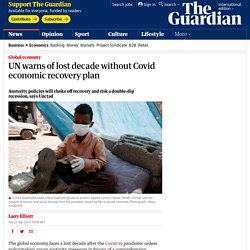
In its annual trade and development report, the UN’s economic arm said a repeat of the cost-cutting conducted by governments after the financial crisis of 2008-09 would choke off recovery and risk a double-dip recession in 2022. The UN Conference on Trade and Development (Unctad) said that, despite a better than expected growth performance in recent months, the global economy was on course to shrink by 4% this year. The turnaround from the near-3% growth predicted before the pandemic struck would cost $6tn (£4.7tn) in lost output, it added, with international trade down by 20%, foreign direct investment dropping by 40% and remittances cut by more than $100bn. Why harsh COVID-19 lockdowns are good for the economy - ABC News.
Six graphs that explain Australia's recession - ABC News. Covid-19: UK economy plunges into deepest recession since records began. Federal Government's record coronavirus spending dwarfs assistance for previous disasters - ABC News. Coronavirus economic update outlines 'eye-watering' debt and frightening unemployment - ABC News. Victoria's coronavirus lockdown won't help an economy that's being held hostage by a pandemic - ABC News. The Coronavirus Could Spark a Food Crisis. Here’s How to Stop It. The coronavirus has focused the world’s attention on the woeful lack of ventilators, respiratory masks, and intensive care unit beds available in many countries.

Far less attention has been paid to another pandemic-driven shortage lurking over the horizon: food. As trade walls go up and governments panic about preserving their own food sources, the coronavirus threatens to disrupt global supply chains. Russia, the world’s largest wheat exporter, is limiting grain exports from April to June. Egypt, the world’s biggest wheat importer, has ramped up grain purchases and stopped exports of legumes. The looming food shortage has an echo of the financial crisis of 2008, when large exporters that were worried about food supplies limited exports, causing a global price surge. IMF head: Dire economic forecasts may be too optimistic. Image copyright AFP How do you co-ordinate economic policy across the globe, when an invisible enemy that behaves in unknown ways systematically erodes the very way economies function?
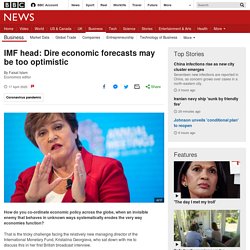
That is the tricky challenge facing the relatively new managing director of the International Monetary Fund, Kristalina Georgieva, who sat down with me to discuss this in her first British broadcast interview. The IMF is now a fire fighting service battling multiple infernos, almost everywhere. World Economic Outlook, April 2020: The Great Lockdown. Chapter 1 The COVID-19 pandemic is inflicting high and rising human costs worldwide, and the necessary protection measures are severely impacting economic activity.
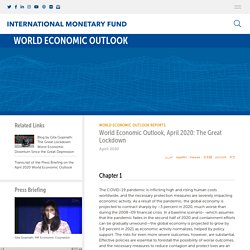
As a result of the pandemic, the global economy is projected to contract sharply by –3 percent in 2020, much worse than during the 2008–09 financial crisis. In a baseline scenario--which assumes that the pandemic fades in the second half of 2020 and containment efforts can be gradually unwound—the global economy is projected to grow by 5.8 percent in 2021 as economic activity normalizes, helped by policy support. The risks for even more severe outcomes, however, are substantial. Effective policies are essential to forestall the possibility of worse outcomes, and the necessary measures to reduce contagion and protect lives are an important investment in long-term human and economic health.
How will coronavirus affect the global economy? Oil prices dip below zero as producers forced to pay to dispose of excess. US oil prices turned negative for the first time on record on Monday as North America’s oil producers run out of space to store an unprecedented oversupply of crude left by the coronavirus crisis.
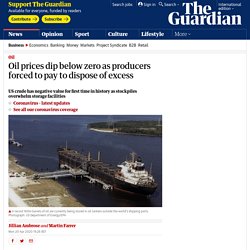
The price of US crude oil collapsed from $18 a barrel to -$38 in a matter of hours, forcing oil producers to pay buyers to take the glut of crude which they cannot store, as rising stockpiles of crude threaten to overwhelm oil storage facilities. “The problem of the global supply-demand imbalance has started to really manifest itself in prices,” said Bjornar Tonhaugen, head of oil at research firm Rystad Energy. “As production continues relatively unscathed, storages are filling up by the day. As coronavirus drives down the economy, how does it compare to the last recession?
Analysis Updated about an hour agoTue 14 Apr 2020, 11:35pm It's close to 30 years since Australia last had a recession.
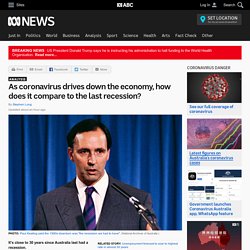
Unemployment rate predicted to reach 10 per cent amid coronavirus pandemic, pushing Australia into recession. Posted about 9 hours agoMon 13 Apr 2020, 2:30pm Unemployment is set to soar to its highest rate in almost three decades, with 1.4 million Australians expected to be out of work.
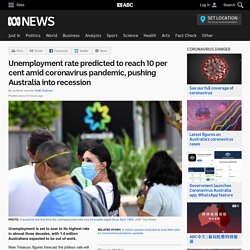
Key points: The exponential growth of coronavirus can be explained by rice on a chessboard. And we should be worried. Analysis Updated about 2 hours agoSun 5 Apr 2020, 12:27am There's a reason Prime Minister Scott Morrison says Australia's households may have to self-isolate for another six months. Prices of essentials and vegetables go up in lockdown impact. In the normal scenario, if there are disruptions in supply chains, retail prices increase and wholesale prices drop. (Photo by Jaspreet Singh) IN WHAT clearly indicates supply-side disruptions after states enforced lockdown to stymie the spread of the COVID-19 pandemic, wholesale prices of essential commodities, especially vegetables, have shown a sharp increase during the last fortnight of March.
The average countrywide prices of vegetables such as onions and tomatoes, which were softening in the first fortnight of March, recorded a perceptible spurt in the second half of the month after March 15 when lockdowns became effective, according to data compiled by the Department of Consumer Affairs. In the normal scenario, if there are disruptions in supply chains, retail prices increase and wholesale prices drop.
But, now, since there is possibly a glut of stocks at one place and goods are not moving, wholesale prices are also showing an increase, economists and agri experts said. Australia's net debt likely to jump to more than $500 billion as massive coronavirus stimulus unleashed. Analysis. Coronavirus continues to batter US economy with 6.65 million filing for unemployment last week. Coronavirus Australia: Crisis talks as Melbourne's train, tram passenger numbers slump by 90% Related Article. Coronavirus May Light Fuse on ‘Unexploded Bomb’ of Corporate Debt.
Daily Mail fuels coronavirus lockdown panic as ABC presenters star live from their living rooms. There was a persistent rumour that the government would announce a lockdown after its Tuesday night meeting of the national cabinet. The “total shutdown” rumour was so widespread across social media that the health minister, Greg Hunt, took to Twitter to dispel it. Morrison's coronavirus 'hibernation plan' needs work to stop economic collapse - ABC News.
Analysis. The economic impact of COVID-19. COVID-19 could affect the global economy in three main ways: by directly affecting production, by creating supply chain and market disruption, and by its financial impact on firms and financial markets. As the COVID-19 crisis deepens, few Australians have much cash in the bank - Grattan Blog. The race to find a coronavirus treatment has one major obstacle: big pharma. Coronavirus impact on major Australian centres leaves Byron Bay and Cairns 'most vulnerable' Updated about 4 hours agoTue 14 Apr 2020, 4:18am Hard-hit tourism and hospitality hubs Byron Bay and Cairns are among important regional centres likely to emerge slowest from the economic rubble of the coronavirus crisis, says an international team of researchers. Key points: 'What’s the point?': Paris fashion faces up to life after lockdown.